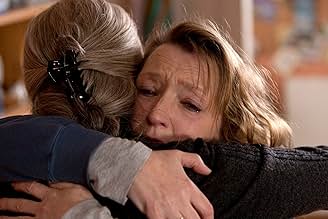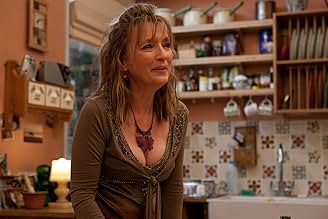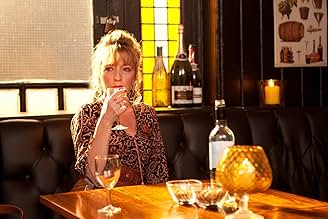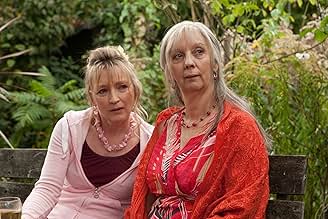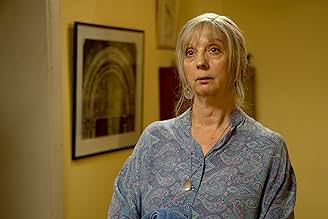Another Year
- 2010
- Tous publics
- 2h 9min
NOTE IMDb
7,4/10
32 k
MA NOTE
Quatre saisons dans la vie d'un couple heureux en ménage et les relations qu'ils ont avec leur famille et leurs amis.Quatre saisons dans la vie d'un couple heureux en ménage et les relations qu'ils ont avec leur famille et leurs amis.Quatre saisons dans la vie d'un couple heureux en ménage et les relations qu'ils ont avec leur famille et leurs amis.
- Réalisation
- Scénario
- Casting principal
- Nommé pour 1 Oscar
- 23 victoires et 57 nominations au total
Avis à la une
This is a big movie tackling big themes, and may, like Happy-Go-Lucky (Mike Leigh's previous film) prove extremely Marmitish. The latter comment may prove hard to understand if you're not British, and that's just like the film (Marmite is a British spread made from yeast extract with a love-it-or-hate-it umami/savoury/salty flavour). Another Year deals with a particularly British form of social breakdown and emotional constipation.
In Britain, from the 40s to the 70s there was widespread use of an exam system called the 11+. Up until the age of 11-12 students were schooled together, after that point, students considered to have more potential by the standards of the 11+ examinations were streamed separately in Grammar Schools, prepared for success, whilst those below the boundary line were sent to Secondary Modern Schools where the focus was much more on practical education (bricklaying, "home economics", woodwork, etc). The legacy of this system has been huge social resentment. There is a feeling in Another Year that the system is back, in the form of university education. With the UK attempting to educate 50% of the secondary school student population to university level, a socially engineered bifurcation to haves and have-nots is being created once again.
All of the characters in the film are from working class backgrounds and yet the fortunes that life has graced them with are distinctly uneven, they have gone in different directions, absent any idea of a shared experience that may have been the rock of previous generations of Britons. Graduates Tom and Gerri (pun intended) have fulfilling careers, heartfelt love for one another, high incomes, and have had the opportunity to travel widely. Tom's brother and Gerri's friend Mary are aging and alone, undereducated, lacking in the kind of accomplishments that are social currency, living with hurt, and in Mary's case, desperation. The message is not all one way, old friend of the family Ken is also a graduate and yet has not managed to find a place in life either.
Scenes in the movie almost exclusively concern Tom and Gerri's catering to this group of friends and family. They deal with the misfortunes of this circle with a mixture of humour, irony, good cooking and alcohol, but mostly conceal their compassion and are helpless onlookers.
The mating game is key here, the unwedded 40+s exist in a state of unsalved distress, futureless, scrapped. Even 30-year-old Joe, functional, graduate, well-employed and witty has struggled to find someone to be with. A notable absence in the movie is a sense of solidarity, community, public events, shared lives and shared values. There's an illiquidity in the relationships marketplace, a lack of feeling and connection, all leading to a general anomie and social constipation.
However painful the lives of Ken and Mary are, the film gives occasional glimpses of far more infernal lives, lower circles of hell where dissatisfaction has paralysed characters with rage or utter resignation. Anything more than a glimpse would have made the film unwatchable.
Gone are the days when WWII veterans would whimper their way through night-times of post-traumatic hallucination for forty years without mentioning it to a soul, however the British "stiff upper lip" still remains as a guiding principle in this movie. There is still very much the assumption that one should keep one's private hell to oneself, or else outsource emotion to a therapist.
What may be controversial in the film is the way you look at how Tom and Gerri treat Mary. A German lady in the audience voiced her opinion to Mike Leigh that the way they treated her was to look down on her, and that she felt this was inappropriate. Mike Leigh responded that the lady felt like this because she was a German and Germans did not understand irony. Maybe I suffer from the same problem because I for one felt that Mary was treated as little more than a baby, and with a certain hauteur, arms-length love. I think people who are lonely need to feel useful. Mary for example was never allowed to help with anything, though this does not excuse her, at times, appalling behaviour (depression makes people selfish, however I feel it necessary to point out as well that someone who is drowning in a river and calling for a life ring, is also being "selfish" in the same way, and I think metaphorically the position is very similar).
Dour joyless watching, maybe one for the Cabinet to watch, after the example of the film La Haine, which concentrated on French malaise and was screened in front of the French cabinet at the instigation of Prime Minister Alain Juppé.
In Britain, from the 40s to the 70s there was widespread use of an exam system called the 11+. Up until the age of 11-12 students were schooled together, after that point, students considered to have more potential by the standards of the 11+ examinations were streamed separately in Grammar Schools, prepared for success, whilst those below the boundary line were sent to Secondary Modern Schools where the focus was much more on practical education (bricklaying, "home economics", woodwork, etc). The legacy of this system has been huge social resentment. There is a feeling in Another Year that the system is back, in the form of university education. With the UK attempting to educate 50% of the secondary school student population to university level, a socially engineered bifurcation to haves and have-nots is being created once again.
All of the characters in the film are from working class backgrounds and yet the fortunes that life has graced them with are distinctly uneven, they have gone in different directions, absent any idea of a shared experience that may have been the rock of previous generations of Britons. Graduates Tom and Gerri (pun intended) have fulfilling careers, heartfelt love for one another, high incomes, and have had the opportunity to travel widely. Tom's brother and Gerri's friend Mary are aging and alone, undereducated, lacking in the kind of accomplishments that are social currency, living with hurt, and in Mary's case, desperation. The message is not all one way, old friend of the family Ken is also a graduate and yet has not managed to find a place in life either.
Scenes in the movie almost exclusively concern Tom and Gerri's catering to this group of friends and family. They deal with the misfortunes of this circle with a mixture of humour, irony, good cooking and alcohol, but mostly conceal their compassion and are helpless onlookers.
The mating game is key here, the unwedded 40+s exist in a state of unsalved distress, futureless, scrapped. Even 30-year-old Joe, functional, graduate, well-employed and witty has struggled to find someone to be with. A notable absence in the movie is a sense of solidarity, community, public events, shared lives and shared values. There's an illiquidity in the relationships marketplace, a lack of feeling and connection, all leading to a general anomie and social constipation.
However painful the lives of Ken and Mary are, the film gives occasional glimpses of far more infernal lives, lower circles of hell where dissatisfaction has paralysed characters with rage or utter resignation. Anything more than a glimpse would have made the film unwatchable.
Gone are the days when WWII veterans would whimper their way through night-times of post-traumatic hallucination for forty years without mentioning it to a soul, however the British "stiff upper lip" still remains as a guiding principle in this movie. There is still very much the assumption that one should keep one's private hell to oneself, or else outsource emotion to a therapist.
What may be controversial in the film is the way you look at how Tom and Gerri treat Mary. A German lady in the audience voiced her opinion to Mike Leigh that the way they treated her was to look down on her, and that she felt this was inappropriate. Mike Leigh responded that the lady felt like this because she was a German and Germans did not understand irony. Maybe I suffer from the same problem because I for one felt that Mary was treated as little more than a baby, and with a certain hauteur, arms-length love. I think people who are lonely need to feel useful. Mary for example was never allowed to help with anything, though this does not excuse her, at times, appalling behaviour (depression makes people selfish, however I feel it necessary to point out as well that someone who is drowning in a river and calling for a life ring, is also being "selfish" in the same way, and I think metaphorically the position is very similar).
Dour joyless watching, maybe one for the Cabinet to watch, after the example of the film La Haine, which concentrated on French malaise and was screened in front of the French cabinet at the instigation of Prime Minister Alain Juppé.
Mike Leighs wonderfully ironic yet sweet look at life takes a little twist in this super ensemble movie which centers around Tom and Gerri and shows us these characters mainly as reflected by their friends and kin. What makes the twist is something written in a different review and which is apparently a Continental European viewpoint if I must believe Mr. Leigh. The minor flaw of this film is that Tom and Gerri hardly develop and if they do, it really is downwards as - when you leave the theatre - you are left with some questions as to whether they really are as warm and supportive as they appear prima facie. Why are all their friends alcoholic losers? And why are they so supportive, yet so aloof? We found a few scenes that show how Tom and Gerri feel about Mary (a shoe-in for any award because of the slightly over-the-top, nail biter performance by Lesley Manville). Their friends really make them feel better about themselves. Whatever may be of this Continental take, it is a tremendously enjoyable movie, as always.
Tom and Gerri (Jim Broadbent and Ruth Sheen), the couple at the centre of Mike Leigh's latest existential piece, couldn't be more unlike the cartoon characters who share their names. Together for several decades, their love for each other has only grown. I wouldn't complain if my marriage looked like theirs when I'm in my 50s.
When he isn't working as a geologist and she isn't counselling people, they spend their time providing solace to those who need it – Ken (Peter Wight), a straight-talking, John Smiths-drinking Yorkshireman; Ronnie (David Bradley), Tom's laconic brother whose wife has just died; and most of all Mary (Lesley Manville), a jittery colleague of Gerri's in the middle of a mid-life crisis. It is Mary who dominates the film and who most elicits our empathy. She is without love and possibly even without the hope of love. It is genuinely painful to see her disintegrate scene by scene.
As another year in Tom and Gerri's life unfolds, we see nothing particularly fascinating happen. They tend to their allotment, they invite people to their house for food and company, and they reminisce about their experiences. Nothing could be more trivial, right? Wrong. This film is about growing old and making the right choices as one gets to old age. Above all it's about recognising that happiness is less a right than an aspiration.
The word 'integrity' comes to mind when I think of Mike Leigh. Who else could convince actors to sign up to films where there was no script to begin with? Throughout his career he has eschewed the Hollywood system and has done things his own way ('Given the choice of Hollywood or poking steel pins in my eyes, I'd prefer steel pins').
An audience member expostulated at the end, 'That wasn't very uplifting'. She's correct, but Leigh doesn't offer folly or fantasy. He's a truth-seeking social observer and commentator. What's also appealing about Leigh is that he doesn't spoon-feed his audience. His films compel the watcher to debate what they have seen and draw their own conclusions. Why should films give us answers?
I was moved by this film like no other in recent memory. One moment I was laughing uncontrollably, the next I was holding back tears. The film emphasises a sad fact: for some people, things don't always go according to plan. Sometimes we're just plain unlucky. And that's life.
www.scottishreview.net
When he isn't working as a geologist and she isn't counselling people, they spend their time providing solace to those who need it – Ken (Peter Wight), a straight-talking, John Smiths-drinking Yorkshireman; Ronnie (David Bradley), Tom's laconic brother whose wife has just died; and most of all Mary (Lesley Manville), a jittery colleague of Gerri's in the middle of a mid-life crisis. It is Mary who dominates the film and who most elicits our empathy. She is without love and possibly even without the hope of love. It is genuinely painful to see her disintegrate scene by scene.
As another year in Tom and Gerri's life unfolds, we see nothing particularly fascinating happen. They tend to their allotment, they invite people to their house for food and company, and they reminisce about their experiences. Nothing could be more trivial, right? Wrong. This film is about growing old and making the right choices as one gets to old age. Above all it's about recognising that happiness is less a right than an aspiration.
The word 'integrity' comes to mind when I think of Mike Leigh. Who else could convince actors to sign up to films where there was no script to begin with? Throughout his career he has eschewed the Hollywood system and has done things his own way ('Given the choice of Hollywood or poking steel pins in my eyes, I'd prefer steel pins').
An audience member expostulated at the end, 'That wasn't very uplifting'. She's correct, but Leigh doesn't offer folly or fantasy. He's a truth-seeking social observer and commentator. What's also appealing about Leigh is that he doesn't spoon-feed his audience. His films compel the watcher to debate what they have seen and draw their own conclusions. Why should films give us answers?
I was moved by this film like no other in recent memory. One moment I was laughing uncontrollably, the next I was holding back tears. The film emphasises a sad fact: for some people, things don't always go according to plan. Sometimes we're just plain unlucky. And that's life.
www.scottishreview.net
Greetings again from the darkness. How DARE he? Mike Leigh is such a non-compliant filmmaker. He just refuses to follow the rules ... and film goers are the benefactors of his daring. Mind you, his daring is not in the regards of special effects, stunt work or trick photography. No sir. His daring is with the subject, theme, tone and characters. He is ... GASP ... unafraid of real people! If you have seen Mr. Leigh's work in "Happy-Go-Lucky" or "Vera Drake", you understand that his films can be simplistic on the surface, while carrying multiple layers of commentary and observations. He also has the classic British sense of humor in that very few "punchlines" exist. Instead the humor comes in allowing the viewer to recognize the characters as someone they know, or God forbid, even their own self!
Mr. Leigh has a history of making films without a script ... only broad based outlines for the characters. The actors then work to fill in the details of the individuals, which in turn, forms a story. This explains why the story does not follow the traditional arc. In fact, the story has no real beginning or ending. What we see are the interactions of people who are friends, relatives, co-workers, acquaintances and strangers.
The foundation of the film, as well as the foundation for most of the other characters in the film, is the happily married couple of Tom and Gerri, played by the terrific Jim Broadbent and Ruth Sheen. This is a couple who not only love and respect each other, but also enjoy being together. Their friends and family come in and out of their lives, but their bond is strong.
Key amongst this group is their friend, and Gerri's co-worker, Mary (Lesley Manville). Mary is someone we all recognize. She is single, not getting any younger, desperately trying to avoid loneliness (too often with a bottle), masking her fear through fake excitement, and latched onto the security blanket offered by Tom and Gerri's friendship.
When family friend Ken (Peter Wight) makes a move on Mary, she shuns him because of his lack of perfection. She always thinks she can do better. When she begins fixating on Tom and Gerri's son Joe (Oliver Maltman), we really feel her pain but just want to slap some sense into her. The relationships all take a hit when Mary shows up for dinner and is introduced to Joe's new girlfriend ... a wonderfully charming and talented Katie (Karina Fernandez). Mary acts the selfish fool and it drives a wedge between she and Gerri. There is even a line of dialogue earlier on ... never come between a mother and her son! Another character we are witness to includes the great Imelda Staunton as a depressed middle-aged woman who comes to Gerri for professional guidance. We also meet David Bradley as Tom's older brother, Ronnie, whose wife has recently passed.
All of these situations and personalities are balanced by Tom and Gerri as they provide a stable environment ... it's as if they are a fountain of sanity from which everyone wishes to drink. As an added touch, none of the characters are Hollywood beauties. Broadbent and Ms. Sheen would never be mistaken for Brad and Angelina. Rather they are more likely to look like someone you know ... and better yet, their characters live like people you WANT to know. So again I ask ... How dare he?
Mr. Leigh has a history of making films without a script ... only broad based outlines for the characters. The actors then work to fill in the details of the individuals, which in turn, forms a story. This explains why the story does not follow the traditional arc. In fact, the story has no real beginning or ending. What we see are the interactions of people who are friends, relatives, co-workers, acquaintances and strangers.
The foundation of the film, as well as the foundation for most of the other characters in the film, is the happily married couple of Tom and Gerri, played by the terrific Jim Broadbent and Ruth Sheen. This is a couple who not only love and respect each other, but also enjoy being together. Their friends and family come in and out of their lives, but their bond is strong.
Key amongst this group is their friend, and Gerri's co-worker, Mary (Lesley Manville). Mary is someone we all recognize. She is single, not getting any younger, desperately trying to avoid loneliness (too often with a bottle), masking her fear through fake excitement, and latched onto the security blanket offered by Tom and Gerri's friendship.
When family friend Ken (Peter Wight) makes a move on Mary, she shuns him because of his lack of perfection. She always thinks she can do better. When she begins fixating on Tom and Gerri's son Joe (Oliver Maltman), we really feel her pain but just want to slap some sense into her. The relationships all take a hit when Mary shows up for dinner and is introduced to Joe's new girlfriend ... a wonderfully charming and talented Katie (Karina Fernandez). Mary acts the selfish fool and it drives a wedge between she and Gerri. There is even a line of dialogue earlier on ... never come between a mother and her son! Another character we are witness to includes the great Imelda Staunton as a depressed middle-aged woman who comes to Gerri for professional guidance. We also meet David Bradley as Tom's older brother, Ronnie, whose wife has recently passed.
All of these situations and personalities are balanced by Tom and Gerri as they provide a stable environment ... it's as if they are a fountain of sanity from which everyone wishes to drink. As an added touch, none of the characters are Hollywood beauties. Broadbent and Ms. Sheen would never be mistaken for Brad and Angelina. Rather they are more likely to look like someone you know ... and better yet, their characters live like people you WANT to know. So again I ask ... How dare he?
I have heard a lot o buzz surrounding Another Year, and it is one of the last Oscar-nominated films I had yet to see. So I had a chance to watch it today, not knowing what type of film it would be since I have not seen other Mike Leigh films. It engaged me from it's opening scene to the last.
This is a masterful film, dwelling with it's characters in truly humane and intriguing ways. This is an ensemble cast, and as a whole they were all great. Jim Broadbent and Ruth Sheen are at the center of the film, and the film takes us on a portrayal of their relationship with others. It is to note that the film is contrasting just how different these two main characters' approach life than the people they are surrounded by. The most notable to these other characters is Mary, played by Lesley Manville. I have to say that she gives one of the best performances of 2010, becoming her character. She is vulnerable and at the same time delusional as to her fantasies in life. It's hard to label her performance as leading or supporting. She has a large amount of screen time, but at the same time she serves only as a window looking in to both Sheen and Broadbent's life. She has definitely created one of the most memorable characters in recent memory, and thats largely because of amazing direction and perhaps the best original screenplay of 2010.
Even when Manville is placed in supporting, it is a shame that the Academy went for a more popular actress (Melissa Leo) when Manville and Weaver (Animal Kingdom) both are amazingly much more effective and either deserved to take home that Oscar (what blasphemy that Manville wasn't even nominated). However, this is a rich film, and certainly one of the best of 2010.
This is a masterful film, dwelling with it's characters in truly humane and intriguing ways. This is an ensemble cast, and as a whole they were all great. Jim Broadbent and Ruth Sheen are at the center of the film, and the film takes us on a portrayal of their relationship with others. It is to note that the film is contrasting just how different these two main characters' approach life than the people they are surrounded by. The most notable to these other characters is Mary, played by Lesley Manville. I have to say that she gives one of the best performances of 2010, becoming her character. She is vulnerable and at the same time delusional as to her fantasies in life. It's hard to label her performance as leading or supporting. She has a large amount of screen time, but at the same time she serves only as a window looking in to both Sheen and Broadbent's life. She has definitely created one of the most memorable characters in recent memory, and thats largely because of amazing direction and perhaps the best original screenplay of 2010.
Even when Manville is placed in supporting, it is a shame that the Academy went for a more popular actress (Melissa Leo) when Manville and Weaver (Animal Kingdom) both are amazingly much more effective and either deserved to take home that Oscar (what blasphemy that Manville wasn't even nominated). However, this is a rich film, and certainly one of the best of 2010.
Le saviez-vous
- AnecdotesTo simulate the four seasons of a year, cinematographer Dick Pope used four different film stocks, and much attention was paid to details in the props so that the passage of time would appear believable.
- GaffesOne of Mary's outlays on her troublesome car was for a new carburettor, but the vehicle in the film had fuel injection.
- ConnexionsFeatured in At the Movies: Cannes Film Festival 2010 (2010)
- Bandes originalesAll Shook Up
Written by Elvis Presley & Otis Blackwell
Used by kind permission of Carlin Music Corp & EMI Publishing
Meilleurs choix
Connectez-vous pour évaluer et suivre la liste de favoris afin de recevoir des recommandations personnalisées
- How long is Another Year?Alimenté par Alexa
Détails
- Date de sortie
- Pays d’origine
- Sites officiels
- Langue
- Aussi connu sous le nom de
- Thêm Một Năm Nữa
- Lieux de tournage
- Sociétés de production
- Voir plus de crédits d'entreprise sur IMDbPro
Box-office
- Budget
- 8 000 000 $US (estimé)
- Montant brut aux États-Unis et au Canada
- 3 205 706 $US
- Week-end de sortie aux États-Unis et au Canada
- 111 869 $US
- 2 janv. 2011
- Montant brut mondial
- 19 722 766 $US
- Durée2 heures 9 minutes
- Couleur
- Mixage
- Rapport de forme
- 2.35 : 1
Contribuer à cette page
Suggérer une modification ou ajouter du contenu manquant








